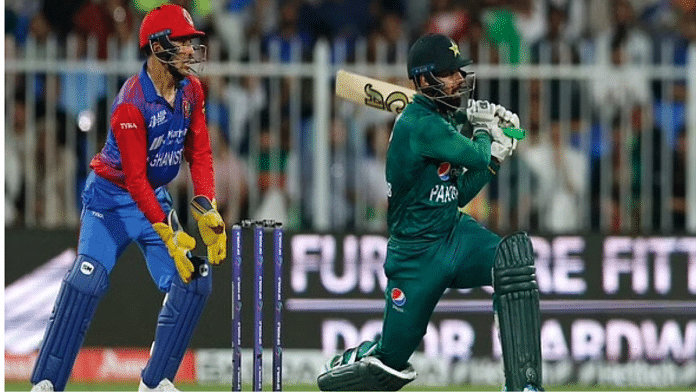New Delhi: Pakistani cricket fans who came to the defence of bowler Naseem Shah after he stumbled over the pronunciation of ‘Lenovo’ have found a rather unique solution that would circumvent future gaffes. Change the name of the tech giant to ‘Lenevivo’.
Naseem Shah’s legion of fans have even launched a petition on Twitter pushing for a name change after a video of Shah went viral recently.
Lenovo Company is about to change its name from Lenovo to Lenvivo after the correct pronunciation by Mr. Naseem Shah.
— u. (@usman_saids) September 15, 2022
The viral video shows an edited snippet of an interview featuring the 19-year-old cricketer with Mohammad Nawaz as they discuss technology with the Quetta Gladiators media team.
LENVEVO 😭😭😭 pic.twitter.com/KRiUOBVLgi
— Out Of Context Cricket (@GemsOfCricket) September 15, 2022
The video garnered several mean reactions, with Indian Twitter users mocking Shah’s spoken English skills as he spelled out Lenovo and pronounced it as ‘Lenevivo’. However, Pakistani Twitter users are not ones to remain quiet as they quickly jumped to Shah’s defence. Many fans pointed to the regressive and ‘colonial’ attitude of some social media users for mocking a Pakistani cricketer for not being proficient in a foreign language.
Colonise tou hum bhe hoae thay lakin bharat ka tou haal he bura hai. Mai tou aaj say naseem Shah ke tarhan he Lenovo bolun ge jo karna hai kar lo.
MASHALLAH MASHALLAH Allah nazray-e-bud say bachaiy itna piyar bacha hai mera chota sa. Mai sadkay joun 💘💘 https://t.co/PP2Ij7VKco
— Kombucha lemon flavour⁷🥞 (@namjoon24x7) September 15, 2022
They also reminded Indians of Shah’s sensational performance against India in the recent Asia Cup tournament. He scored 14 runs off four balls by hitting two celebrated sixes in the last hour and helped his team establish victory over Afghanistan by one wicket.
Well, Naseem Shah can't pronounce Lenovo and Indian Batsmen can't play Naseem Shah. 🙂 https://t.co/Es0aOEDFUb
— Abdul Afaan (@_abdulafaan_) September 15, 2022
Also read: Senior Pak ministers booked in terror case for spreading religious hatred against Imran Khan
History of English-shaming
This is not the first time that cricketers–and even athletes—on both sides of the border have been mocked for their poor English skills.
In countries like India and Pakistan with a colonial past, fluency in English has always been the privilege of the elite and those living in cities. “The language has become another tool for social stratification. The anglophone elite has long looked down on non-speakers, and fluency in English is generally considered a suitable proxy for intelligence and competence,” said the authors of a Harvard Political Review report, ‘Redefining Colonial Legacies’.
Earlier this year, Pakistani skipper Babar Azam was mocked by some Indian Twitter handles for being unable to speak in English during a post-match ceremony. One user tweeted, ‘Even Sarfaraz used to speak better English than Babar Azam.’
Fans defended the skipper, reminding his critics that Babar Azam is currently among the top 5 batters in all the formats of cricket and is leading the ICC Men’s ODI and T20I rankings.
Indian athletes, too, have often been on the receiving end of criticism for their spoken English skills.
Neeraj Chopra, a gold medal-winning track and field athlete too has faced criticism regarding his language skills. He recently addressed the issue, saying, “I know my English is not perfect but I try my best. It has improved a lot with talking to my coach. I know that athletics is a global sport and I want to reach everyone. I know that I can’t find a translator everywhere so I try my best,” in an interview after winning the Diamond League in Zurich earlier this year.
Even the Athletic Federation of India (AFI) faced flak in 2018 for its tweet congratulating athlete Hima Das for her historic win at the IAAF Under-20 World Junior Championships while noting her lack of fluency in the English language.
#HimaDas speking to media after her SF win at #iaaftampere2018 @iaaforg Not so fluent in English but she gave her best there too. So proud of u #HimaDas Keep rocking & yeah,try ur best in final! @ioaindia @IndianOlympians @TejaswinShankar @PTI_News @StarSportsIndia @hotstartweets pic.twitter.com/N3PdEamJen
— Athletics Federation of India (@afiindia) July 12, 2018
(Edited by Ratan Priya)



